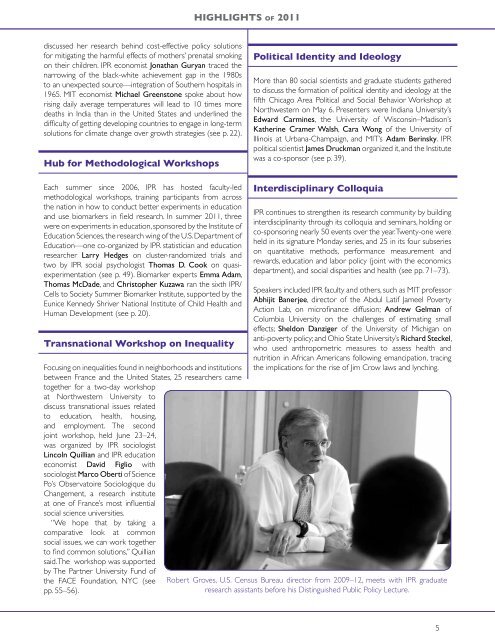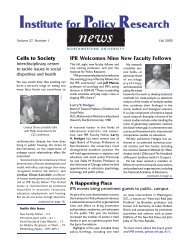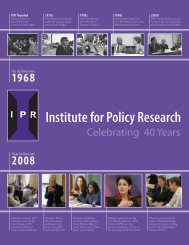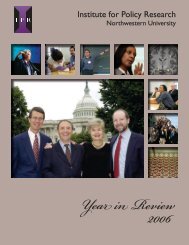Highlights of 2011 - Institute for Policy Research - Northwestern ...
Highlights of 2011 - Institute for Policy Research - Northwestern ...
Highlights of 2011 - Institute for Policy Research - Northwestern ...
Create successful ePaper yourself
Turn your PDF publications into a flip-book with our unique Google optimized e-Paper software.
HIGHLIGHTS OF <strong>2011</strong><br />
discussed her research behind cost-effective policy solutions<br />
<strong>for</strong> mitigating the harmful effects <strong>of</strong> mothers’ prenatal smoking<br />
on their children. IPR economist Jonathan Guryan traced the<br />
narrowing <strong>of</strong> the black-white achievement gap in the 1980s<br />
to an unexpected source—integration <strong>of</strong> Southern hospitals in<br />
1965. MIT economist Michael Greenstone spoke about how<br />
rising daily average temperatures will lead to 10 times more<br />
deaths in India than in the United States and underlined the<br />
difficulty <strong>of</strong> getting developing countries to engage in long-term<br />
solutions <strong>for</strong> climate change over growth strategies (see p. 22).<br />
Hub <strong>for</strong> Methodological Workshops<br />
Political Identity and Ideology<br />
More than 80 social scientists and graduate students gathered<br />
to discuss the <strong>for</strong>mation <strong>of</strong> political identity and ideology at the<br />
fifth Chicago Area Political and Social Behavior Workshop at<br />
<strong>Northwestern</strong> on May 6. Presenters were Indiana University’s<br />
Edward Carmines, the University <strong>of</strong> Wisconsin–Madison’s<br />
Katherine Cramer Walsh, Cara Wong <strong>of</strong> the University <strong>of</strong><br />
Illinois at Urbana-Champaign, and MIT’s Adam Berinsky. IPR<br />
political scientist James Druckman organized it, and the <strong>Institute</strong><br />
was a co-sponsor (see p. 39).<br />
Each summer since 2006, IPR has hosted faculty-led<br />
methodological workshops, training participants from across<br />
the nation in how to conduct better experiments in education<br />
and use biomarkers in field research. In summer <strong>2011</strong>, three<br />
were on experiments in education, sponsored by the <strong>Institute</strong> <strong>of</strong><br />
Education Sciences, the research wing <strong>of</strong> the U.S. Department <strong>of</strong><br />
Education—one co-organized by IPR statistician and education<br />
researcher Larry Hedges on cluster-randomized trials and<br />
two by IPR social psychologist Thomas D. Cook on quasiexperimentation<br />
(see p. 49). Biomarker experts Emma Adam,<br />
Thomas McDade, and Christopher Kuzawa ran the sixth IPR/<br />
Cells to Society Summer Biomarker <strong>Institute</strong>, supported by the<br />
Eunice Kennedy Shriver National <strong>Institute</strong> <strong>of</strong> Child Health and<br />
Human Development (see p. 20).<br />
Transnational Workshop on Inequality<br />
Focusing on inequalities found in neighborhoods and institutions<br />
between France and the United States, 25 researchers came<br />
together <strong>for</strong> a two-day workshop<br />
at <strong>Northwestern</strong> University to<br />
discuss transnational issues related<br />
to education, health, housing,<br />
and employment. The second<br />
joint workshop, held June 23–24,<br />
was organized by IPR sociologist<br />
Lincoln Quillian and IPR education<br />
economist David Figlio with<br />
sociologist Marco Oberti <strong>of</strong> Science<br />
Po’s Observatoire Sociologique du<br />
Changement, a research institute<br />
at one <strong>of</strong> France’s most influential<br />
social science universities.<br />
“We hope that by taking a<br />
comparative look at common<br />
social issues, we can work together<br />
to find common solutions,” Quillian<br />
said. The workshop was supported<br />
by The Partner University Fund <strong>of</strong><br />
the FACE Foundation, NYC (see<br />
pp. 55–56).<br />
Interdisciplinary Colloquia<br />
IPR continues to strengthen its research community by building<br />
interdisciplinarity through its colloquia and seminars, holding or<br />
co-sponsoring nearly 50 events over the year. Twenty-one were<br />
held in its signature Monday series, and 25 in its four subseries<br />
on quantitative methods, per<strong>for</strong>mance measurement and<br />
rewards, education and labor policy (joint with the economics<br />
department), and social disparities and health (see pp. 71–73).<br />
Speakers included IPR faculty and others, such as MIT pr<strong>of</strong>essor<br />
Abhijit Banerjee, director <strong>of</strong> the Abdul Latif Jameel Poverty<br />
Action Lab, on micr<strong>of</strong>inance diffusion; Andrew Gelman <strong>of</strong><br />
Columbia University on the challenges <strong>of</strong> estimating small<br />
effects; Sheldon Danziger <strong>of</strong> the University <strong>of</strong> Michigan on<br />
anti-poverty policy; and Ohio State University’s Richard Steckel,<br />
who used anthropometric measures to assess health and<br />
nutrition in African Americans following emancipation, tracing<br />
the implications <strong>for</strong> the rise <strong>of</strong> Jim Crow laws and lynching.<br />
Robert Groves, U.S. Census Bureau director from 2009–12, meets with IPR graduate<br />
research assistants be<strong>for</strong>e his Distinguished Public <strong>Policy</strong> Lecture.<br />
5

















